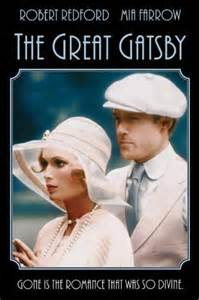Enduring legends are not only immune to exaggeration, they actually draw increased power from the wide variance of every subsequent retelling. In that tradition, F. Scott’s Fitzgerald’s The Great Gatsby continues to evolve nearly a full century down the line. What’s more, the novel’s central character (Jay Gatsby) remains the gold standard for every international man of mystery who has sprung up in his wake – Bruce Wayne, Charles Foster Kane, and even Donald Draper chief among them.
Gatsby? What Gatsby?
It’s a question for the ages, to be sure. For literary purists, the only real Gatsby is the one who was originally introduced via F. Scott Fitzgerald’s 1925 novel. For film geeks, on the other hand, there are a plethora of choices. There’s the silent-era Gatsby, the post-World-War-II Gatsby, the Jazz-age Gatsby, the made-for-TV Gatsby, and – as of this coming Friday – there’ll even be a kaleidoscopic Gatsby … a veritable feast for the eyes that looks and feels a lot more like Baz Luhrmann’s own personal Wizard of Oz.
And yet, the classic Gatsby – at least in terms of modern cinema – was, is, and probably always will be the 1974 Jack Clayton version, based on a screenplay adaptation by Francis Ford Coppola. This is the version that captures every subtle nuance from The Eyes to The Ashlands. It’s the version that includes location shoots in and around Morningside Heights, The Plaza Hotel and Trinity Church. It’s the version in which Sam Waterston appears to be a wide-eyed prep-school nerd and Mia Farrow showcases a voice that’s rife with money; in which Bruce Dern bounces back and forth between bull-headed bigot and brute; in which (Karen Black’s) Myrtle Wilson staggers drunk and desperate as a dime-store trollop. It’s the only movie version that manages to capture Gatsby without over- or under-doing the whole thing. And therein lies its undying charm.
At its core, Jack Clayton’s Gatsby succeeds because it emphasizes all the major literary themes – wealth, power, privilege, class, love, sex, god, intrigue, suspense, betrayal, violence, death, tragedy, comedy, mystery and drama. It’s the classic tale of a poor boy from the other side of the tracks, shot through with the unrivaled angst of every man who has ever had something he loved stolen away from him.
There are, of course, some dated sequences here – moments during which the pace and/or acting seems far too labored or severe. But on balance, Redford, Farrow, Waterston, Dern and Clayton combine to offer a cinematic Gatsby for the annals – the only film version that actually does justice to Fitzgerald’s original source material, despite the increased popularity Gatsby has experienced over the years, thanks – in large part – to the extreme variance of every subsequent retelling.
(Jack Clayton’s The Great Gatsby is currently streaming via Netflix.)

